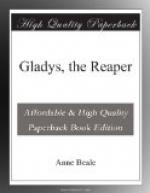I must beg my readers to pass over in their imaginations one twelvemonth, of which I do not mean to say anything, and to accompany me to the gate at Glanyravon Farm, where they first made acquaintance with Mrs Prothero and Gladys. A hasty glance will suffice to show that all is much the same at this said gate as it was ten years ago, save and except that the extraneous accompaniments are changed. Instead of a group of Irish beggars and a dying girl, it is surrounded by a party of well-dressed peasants in high, smooth hats and striped flannel gowns. Moreover, it is surrounded by an arch of evergreens and flowers, of most tasteful form and beautiful colour.
We will not linger here at present, but pursue our way along the road. We meet more peasants, in holiday costume, talking and laughing together, with Miss Gwynne’s school children in their scarlet cloak and best frocks. They all seem to be lingering about, with nothing to do, and enjoying their idleness and June holiday as thoroughly as the greatest philanthropist in the world could desire. As we approach the entrance of the Park, we see another magnificent arch spanning the road. We turn to the large iron gates, and they, too, are circled with laurels and roses.
We walk through the gates, and to the right, far in amongst the trees, are long lines of tables covered with white, and bearing the remains of a huge feast, at which, we take it for granted, the people we have met have been regaled. Scattered here and there amongst the oaks, elms, and ashes are more peasants and school children amusing themselves variously.
We pursue our way up the drive until we come to the memorable oak, under which words were spoken greatly influencing the fates of two of the individuals in whom I have been endeavouring to interest my readers. From this venerable tree to another, almost as venerable, hangs another wreath, flanked with banners. We reach the house, and another garland entirely surrounds the door. White roses and lillies of the valley make the air heavy with their breath, drawn out by the attractive rays of the beaming afternoon sun.
We enter the hall, and peep into the different rooms. In the dining-room is the remains of an ample repast. At the head of the table is an enormous cake, covered with silver doves and ornaments of all kinds; servants are drinking the remains of champagne out of glasses and bottles with healths innumerable. In the library and hall, children in white frocks, with silver bows fastened to them, pattering to and fro in unchecked excitement. In the drawing-room we pause, and listen to the conversation that is passing between Mr Gwynne, Lady Mary, Colonel and Mrs Gwynne Vaughan, and Sir Hugh Pryse.
‘I am so thankful it is over, and that it has all gone off so well,’ says Lady Mary.
‘Really, Lady Mary,’ says Mr Gwynne, ’great thanks are due to you for the admirable manner in which you managed everything. I think it was wonderful that we amalgamated, and all that sort of thing, don’t you, Gwynne?’




